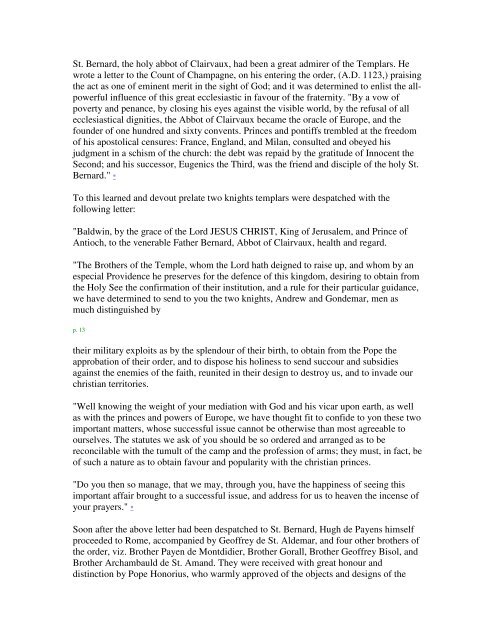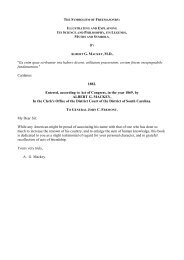The History of the Knights Templar by Charles G ... - Masonic Renewal
The History of the Knights Templar by Charles G ... - Masonic Renewal
The History of the Knights Templar by Charles G ... - Masonic Renewal
You also want an ePaper? Increase the reach of your titles
YUMPU automatically turns print PDFs into web optimized ePapers that Google loves.
St. Bernard, <strong>the</strong> holy abbot <strong>of</strong> Clairvaux, had been a great admirer <strong>of</strong> <strong>the</strong> <strong>Templar</strong>s. He<br />
wrote a letter to <strong>the</strong> Count <strong>of</strong> Champagne, on his entering <strong>the</strong> order, (A.D. 1123,) praising<br />
<strong>the</strong> act as one <strong>of</strong> eminent merit in <strong>the</strong> sight <strong>of</strong> God; and it was determined to enlist <strong>the</strong> allpowerful<br />
influence <strong>of</strong> this great ecclesiastic in favour <strong>of</strong> <strong>the</strong> fraternity. "By a vow <strong>of</strong><br />
poverty and penance, <strong>by</strong> closing his eyes against <strong>the</strong> visible world, <strong>by</strong> <strong>the</strong> refusal <strong>of</strong> all<br />
ecclesiastical dignities, <strong>the</strong> Abbot <strong>of</strong> Clairvaux became <strong>the</strong> oracle <strong>of</strong> Europe, and <strong>the</strong><br />
founder <strong>of</strong> one hundred and sixty convents. Princes and pontiffs trembled at <strong>the</strong> freedom<br />
<strong>of</strong> his apostolical censures: France, England, and Milan, consulted and obeyed his<br />
judgment in a schism <strong>of</strong> <strong>the</strong> church: <strong>the</strong> debt was repaid <strong>by</strong> <strong>the</strong> gratitude <strong>of</strong> Innocent <strong>the</strong><br />
Second; and his successor, Eugenics <strong>the</strong> Third, was <strong>the</strong> friend and disciple <strong>of</strong> <strong>the</strong> holy St.<br />
Bernard." *<br />
To this learned and devout prelate two knights templars were despatched with <strong>the</strong><br />
following letter:<br />
"Baldwin, <strong>by</strong> <strong>the</strong> grace <strong>of</strong> <strong>the</strong> Lord JESUS CHRIST, King <strong>of</strong> Jerusalem, and Prince <strong>of</strong><br />
Antioch, to <strong>the</strong> venerable Fa<strong>the</strong>r Bernard, Abbot <strong>of</strong> Clairvaux, health and regard.<br />
"<strong>The</strong> Bro<strong>the</strong>rs <strong>of</strong> <strong>the</strong> Temple, whom <strong>the</strong> Lord hath deigned to raise up, and whom <strong>by</strong> an<br />
especial Providence he preserves for <strong>the</strong> defence <strong>of</strong> this kingdom, desiring to obtain from<br />
<strong>the</strong> Holy See <strong>the</strong> confirmation <strong>of</strong> <strong>the</strong>ir institution, and a rule for <strong>the</strong>ir particular guidance,<br />
we have determined to send to you <strong>the</strong> two knights, Andrew and Gondemar, men as<br />
much distinguished <strong>by</strong><br />
p. 13<br />
<strong>the</strong>ir military exploits as <strong>by</strong> <strong>the</strong> splendour <strong>of</strong> <strong>the</strong>ir birth, to obtain from <strong>the</strong> Pope <strong>the</strong><br />
approbation <strong>of</strong> <strong>the</strong>ir order, and to dispose his holiness to send succour and subsidies<br />
against <strong>the</strong> enemies <strong>of</strong> <strong>the</strong> faith, reunited in <strong>the</strong>ir design to destroy us, and to invade our<br />
christian territories.<br />
"Well knowing <strong>the</strong> weight <strong>of</strong> your mediation with God and his vicar upon earth, as well<br />
as with <strong>the</strong> princes and powers <strong>of</strong> Europe, we have thought fit to confide to yon <strong>the</strong>se two<br />
important matters, whose successful issue cannot be o<strong>the</strong>rwise than most agreeable to<br />
ourselves. <strong>The</strong> statutes we ask <strong>of</strong> you should be so ordered and arranged as to be<br />
reconcilable with <strong>the</strong> tumult <strong>of</strong> <strong>the</strong> camp and <strong>the</strong> pr<strong>of</strong>ession <strong>of</strong> arms; <strong>the</strong>y must, in fact, be<br />
<strong>of</strong> such a nature as to obtain favour and popularity with <strong>the</strong> christian princes.<br />
"Do you <strong>the</strong>n so manage, that we may, through you, have <strong>the</strong> happiness <strong>of</strong> seeing this<br />
important affair brought to a successful issue, and address for us to heaven <strong>the</strong> incense <strong>of</strong><br />
your prayers." *<br />
Soon after <strong>the</strong> above letter had been despatched to St. Bernard, Hugh de Payens himself<br />
proceeded to Rome, accompanied <strong>by</strong> Ge<strong>of</strong>frey de St. Aldemar, and four o<strong>the</strong>r bro<strong>the</strong>rs <strong>of</strong><br />
<strong>the</strong> order, viz. Bro<strong>the</strong>r Payen de Montdidier, Bro<strong>the</strong>r Gorall, Bro<strong>the</strong>r Ge<strong>of</strong>frey Bisol, and<br />
Bro<strong>the</strong>r Archambauld de St. Amand. <strong>The</strong>y were received with great honour and<br />
distinction <strong>by</strong> Pope Honorius, who warmly approved <strong>of</strong> <strong>the</strong> objects and designs <strong>of</strong> <strong>the</strong>



